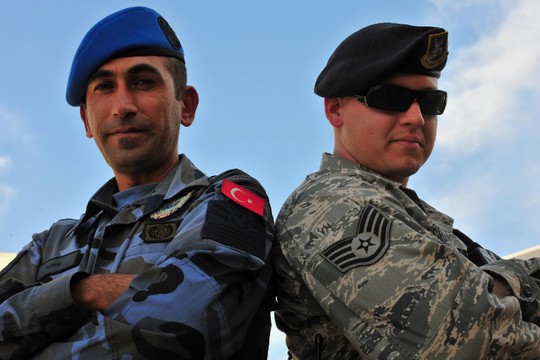Turkey & US soldiers
Washington has dusted up its old toolbox to re-engage its cold-war ally Turkey and resuscitate their moribund alliance to serve the US’ geo-strategic interests in the rapidly changing regional environment. This stems out of a realisation that no matter the demonisation of President Recep Erdogan as an outlier, Turkey’s potentials as a “swing state” remains a geopolitical reality, writes M.K. Bhadrakumar, Indian Ambassador and prominent international observer.
Arguably, this realisation follows the grudging recognition by Washington that the old dogma of ‘you are with us, or against us’ cannot and should not apply to emerging countries like Turkey — or India, Indonesia, Brazil, etc. for that matter — at a time of diminishing US influence in global affairs.
Indeed, Turkey’s importance to US global policies has sharply risen in direct proportion to the US’ confrontation with Russia, which has leaped out of the proxy war in Ukraine which began in 2014 and has turned into the First Circle of American foreign policies and diplomacy currently, when the Sino-Russian has reached the level of a quasi-alliance and the transatlantic alliance system has come under stress.
Yet, in this paradigm, Russia continues to seek an intrinsic, mutually beneficial partnership with Turkey in a historical context rather than as a fallout of the vicissitudes of the Turkish-American relationship. Indeed, such an approach is also prudent because Russia and Turkey had a difficult common history.
Moscow’s focus is on injecting as much positive content to the relations with Ankara, especially in the conditions under sanctions, which has created interest groups on the Turkish side and significantly boosted Russia’s “soft power” in Anatolia. (A similar phenomenon appears vis-a-vis India, too.)
Thus, while Erdogan may find Russia to be a useful balancer vis-a-vis the US, Moscow sees no reason to feel perturbed by the recent thaw in Turkey’s ties with the US.
That said, Russia cannot but be intensely conscious that Turkey is a unique NATO member country which is genuinely seeking an expansion of the relationship with it and is committed to a dynamic partnership on a broad spectrum ranging from energy to missiles to tourism — and, equally, has a finely balanced relationship with Iran, Russia’s most important West Asian partner.
From the American perspective, the Russo-Turkish cooperation is crucial to the security of the Black Sea region, which is at the vortex of the Ukraine conflict. Under the Montreaux Convention (1936), Turkey controls the straits of Dardanelles and Bosporus, access to which could be a game changer for the US’ expansionist strategies for NATO currently. Of course, Turkey’s closure of Bosporus to western warships in the prevailing war conditions in Ukraine tilts the balance of forces in the Black Sea in favour of Russia.
Besides, the security of the Black Sea and Eastern Mediterranean impacts Russia’s growing presence in North Africa, Sahel region and the Central African Republic as a whole, which are rich in minerals. Having succeeded in bringing Armenia into the western orbit and remove the Russian peacekeeping force in Nagorno-Karabakh, the next phase could well be a NATO push to shut down the Russian base in Armenia. Therefore, Turkey’s influence in Transcaucasia is potentially a game changer in the long term, where Russia’s restive Muslim republics in North Caucasus are in the West’s crosshairs.
Turkey refused to sanction Russia and has instead shown readiness for an expansion of relations with it. Over 6 million Russian tourists visited Turkey last year. On major regional and international issues, Turkey’s stance is increasingly at variance with Washington’s.
Thus, notably, Turkey did not join the US-led coalition confronting the Houthis in the Red Sea. During the past week, it was disclosed that Turkey has applied to participate in the International Lunar Research Station jointly initiated by China and Russia (in preference to NASA’s moon exploration programme known as Artemis.)
Again, Turkey strongly condemned the Israeli air strike against the Iranian embassy compound in Damascus on April 1, whereas, Ankara’s response to Iran’s airstrike against Israel on April 13 was delayed and was in a subdued tone with the primary concern being the potential spread of Israel’s Gaza conflict throughout the region, followed by the apprehension that international attention may shift from the Gaza tragedy.
Indeed, Turkey is the only NATO country which refused to support the US-sponsored joint statement against Iran over its retaliatory strike against Israel.
read more in our Telegram-channel https://t.me/The_International_Affairs

 11:27 26.04.2024 •
11:27 26.04.2024 •























